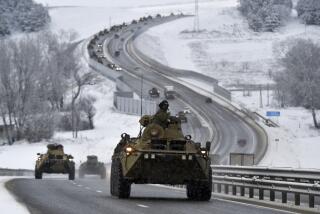Balancing the Books Becomes a Balancing Act in Russia
- Share via
MOSCOW — Russia’s perilous cash-flow crisis suffered two new setbacks Friday when the government gave the powerful gas monopoly Gazprom another month to pay more than $1 billion in overdue taxes and Royal Dutch Shell pulled out of the bidding for a major state oil company.
Both moves mean further delay in filling the empty coffers of the federal government, which has been dealing with a perpetual revenue shortage by holding up the pay and pensions of government workers. Angry miners, teachers and medical workers have been responding with strikes and blockades, inflicting an even harsher toll on the teetering economy.
“Tough measures will be taken against everyone who is not paying taxes,” Prime Minister Sergei V. Kiriyenko told a news conference, contending that the Kremlin is now serious about cracking down on tax delinquents.
But after the government backed off from threats made a day earlier to seize bank accounts, yachts, villas and other assets from the garishly wealthy Gazprom, its latest vows to improve tax collections held little promise of imminent relief.
Gazprom, which employs nearly 400,000 people and owns an array of planes, luxury cars, resorts and real estate, is the most important contributor to the federal budget: It is supposed to provide nearly 25% of all monthly tax revenues.
In June, however, Gazprom paid only about one-fifth of its tax debt, claiming that it had not received payment from bankrupt state-owned enterprises and local government energy networks for its gas deliveries.
Russia’s newly appointed tax chief, Boris Fedorov, said Friday that Gazprom has been given until Aug. 1 to pay its tax arrears in full, regardless of its claims of being owed more by government entities than it owes to the state.
Fedorov said his calculation of Gazprom’s debt to the government was 6.4 billion rubles, or just more than $1 billion.
Russian President Boris N. Yeltsin made a rare appearance in the Kremlin to meet with Gazprom chief Rem Vyakhirev and ordered him to draw up a repayment plan within 24 hours.
Yeltsin’s spokesman, Sergei V. Yastrzhembsky, described the session as “a rather rough conversation,” but an undaunted Vyakhirev dismissed the targeting of Gazprom as “a provocation” and immediately left to visit Austria.
Meanwhile, Royal Dutch Shell announced in London that it was dropping plans to make a joint bid with Gazprom and Russian oil giant Lukoil for a 75% stake in Rosneft, the last major state-owned oil company on the auction block.
The Russian government recently lowered the minimum bid for the Rosneft shares to $1.6 billion from the $2.1 billion sought in an initial offering this year that drew no bidders. With Shell’s retreat, on the grounds that world oil prices and Russian economic problems make the purchase unwise, the Rosneft sale will probably have to be postponed and the minimum bid again lowered.
Shell, the world’s largest publicly traded oil company, said in a statement announcing the pullout that the decision would not affect its plans to invest $1 billion in developing oil and gas ventures with Gazprom and Lukoil. But the retreat underscored the doubts that many Western investors have about Russia as it struggles through its recurring economic troubles--especially in the volatile oil market, in which prices have recently tumbled to their lowest level in a decade.
While the two events might cause little more than a ripple in more developed economies, depriving the state coffers of Gazprom’s tax contributions for even a month and the delay of urgently needed income from Rosneft’s privatization are expected together to seriously worsen Russia’s crisis of nonpayments.
The developments may also deter a bailout by the International Monetary Fund, which has delayed the latest $700-million payout of a $10-billion loan program until the government demonstrates that it is doing more to collect its own taxes.
Russian officials are also negotiating with the IMF and other international lenders for a $10-billion to $15-billion aid package that would allow more than a temporary patching of Russia’s cash-flow holes.
More to Read
Sign up for Essential California
The most important California stories and recommendations in your inbox every morning.
You may occasionally receive promotional content from the Los Angeles Times.














